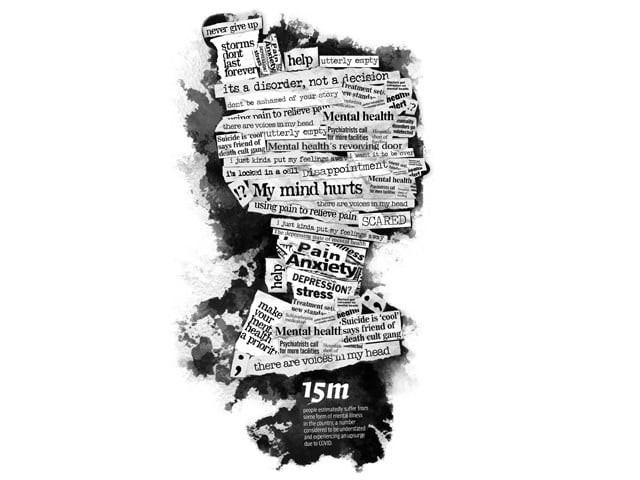Deteriorating mental health least of government’s concerns
Lack of psychiatrists, awareness has resulted in people not having an outlet to seek help for stress, depression

The effect of the superspreader virus, which has gripped the globe for the last two years, on the mental health of direct and indirect affectees is quite understated.
Those affected by the onslaught of the virus include the ones who contracted it, lost their jobs due to the economic crunch it caused, or were confined to their homes due to lockdowns to curb its spread. Many endured and are still enduring COVID related anxiety stemming from the worry of their loved ones, not having a source of income, or not having any social interaction.
In Pakistan’s context, on this day regarding awareness of mental health and advocating against the social stigma associated with it, statistics from Pakistan Association for Mental Health, a Karachi-based organization, show that more than 15 million people in the country suffer from some form of mental illness. A number, which is considered to be understated by experts, experiencing a consistent upsurge in light of the havoc that the superspreader has wreaked all over the country.
Professor Dr Muhammad Iqbal Afridi, Head of the Psychiatric Faculty of the College of Physicians and Surgeons of Pakistan and President of the Pakistan Psychiatric Society, acknowledging the growth in post-Covid mental health cases, told The Express Tribune that people were suffering with severe depression, anxiety, and restlessness. Afridi added, "due to isolating at homes, patients were found to be irritable, and complaints of squabbling were also reported. Such drastic changes in a person's emotions, thinking and behavior are a sign of poor mental health."
Read Mental health
Battling the rising cases requires more professionals with experience in dealing with mental health issues, a view Afridi seconded stating: “Psychiatrists in the country believe that the government should invest more in mental health because the effects of the virus are still present in people's minds.” Back in the 1960s, the American Psychiatric Association (APA) recommended a psychiatrist to population ratio of 1:10,000 meaning 1 psychiatrist per 10,000 people; this ratio was later revised to 1:8,000 to accommodate growing mental health related cases. In Pakistan, according to Dr Imran Khan, who is the Head of the Department of Psychiatry Khyber Teaching Hospital in Peshawar, we have an insignificant number of 500 well-trained psychiatrists and only roughly 3 to 4 good child psychiatrists in the entire country.
Zawar Khan, a resident of Peshawar, felt the effects of a psychiatrist shortage firsthand when he experienced virus-related stress. Zawar was working in a private bank before he received a dismissal letter during peak Covid related lockdowns. “It was a difficult time for me as I had severe anxiety and depression but no one to help. I was suicidal at one point because I could not even afford the school fee of my children and other household expenditures”, Zawar added.
Similarly, Shahid, currently employed at a Lahore-based private company, lost his job when Covid induced lockdowns were the rage in Punjab. “Those few months were difficult, even though I have a job now the trauma from that time weighs heavily on my mind and hinders my work,” he informed seconding Zawar’s views that ample mental health care was not available.
Read more World Mental Health Day observed
Professor Rafia Rafique, a psychologist and head of the psychology department at Punjab University, acknowledging that citizens of Pakistan’s most populous province were struggling mentally due to the life-threatening pandemic, blamed the government. “No measures have been taken by the government to provide relief to the people with mental health problems or create awareness,” Rafia said, “the government should have deputed a psychologist at every hospital so that people could readily avail counseling on the mental health but the needful was not done.”
Shedding light on initiatives taken by other psychologists in the absence of any government initiative, Rafia stated that about 250 psychologists had become part of an online network at Punjab University to provide relief to the people facing mental issues. It is important to note that a clinical psychologist and psychiatrist are two different professions - a psychiatrist is a medical doctor whereas a psychologist is not. Rafia’s online psychologist platform’s target group for the therapy session were students. “We witnessed a large number of students approach the online counseling website to discuss their mental health problems with the experts,” she said, highlighting that students had suffered a lot in the pandemic as well.
One such student is Adnan Ijaz, who attends a private school in Lahore. A visibly frustrated Adnan, while talking to The Express Tribune, said, “the sense of physical alienation from the educational institution and anxiety from online education has impacted my mental health negatively and I just hope this easing of lockdowns is the end.”



















COMMENTS
Comments are moderated and generally will be posted if they are on-topic and not abusive.
For more information, please see our Comments FAQ